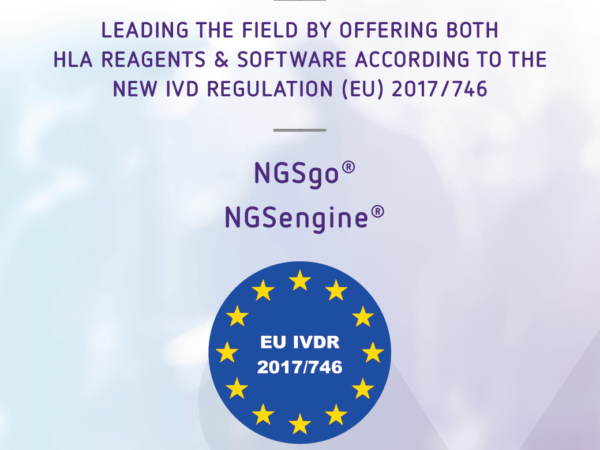The first company in the field of transplant diagnostics complying with the new IVDR in Europe
PRESS RELEASE
We are very excited to share with you that we received the EU Quality Management Certificate (IVDR) by our notified body Tüv Süd for diagnostic use of our HLA product portfolio. This new IVDR (EU) 2017/746 sets increased standards of quality and safety for diagnostic use of medical devices to ensure the highest level of public health protection.
The IVD Regulation retains all existing IVD Directive requirements, and includes new stringent additional conditions for in vitro diagnostic devices. Establishing increased quality management, continuous evaluation during the products life cycle and more technical documentation to prove effectiveness are included now. The GenDx HLA portfolio under IVDR contains NGSgo® reagents and NGSengine® software for high-resolution HLA typing. Being one of the first to get certified under the IVDR sets a bench mark for similar products in the field of HLA typing, especially for stand-alone software.
Given the complexity of capturing validation data and building extensive dossiers to obtain IVDR certification, only a few IVD companies have obtained this new certification. The majority of manufacturers is still in the process to implement and prove IVDR compliance for their products.
Therefore, the EU decided recently that, although the effective date of 26 May 2022 remains unchanged, under certain conditions, manufacturers will receive more time to transition to the IVDR. This also applies for GenDx’s chimerism monitoring products, currently CE self-marked under the IVDD.
 Wietse Mulder PhD, CEO of GenDx, commented: ‘After a few years of extensive teamwork, we are proud to be the first global supplier in the field of transplant diagnostics, being able to offer a full HLA workflow portfolio under the new IVD Regulation. As a result we can continue to provide our customers with certified products, claiming increased safety and offer improved quality, that will finally benefit transplant patients”.
Wietse Mulder PhD, CEO of GenDx, commented: ‘After a few years of extensive teamwork, we are proud to be the first global supplier in the field of transplant diagnostics, being able to offer a full HLA workflow portfolio under the new IVD Regulation. As a result we can continue to provide our customers with certified products, claiming increased safety and offer improved quality, that will finally benefit transplant patients”.
Read full press release here


